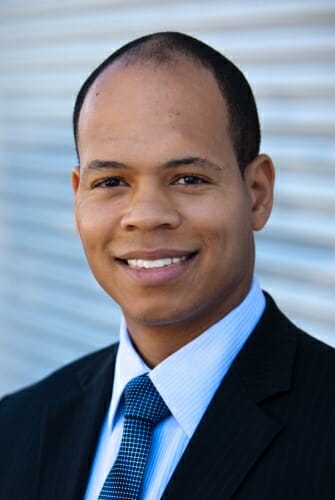Randolph Ashton named SCRMC associate director
Randolph Ashton, assistant professor of biomedical engineering, is the new associate director for UW–Madison’s Stem Cell and Regenerative Medicine Center. He joins Timothy Kamp, center director and professor of medicine, cell and regenerative biology, and succeeds William Murphy, professor of biomedical engineering and SCRMC co-director from 2012 to 2018.
Ashton joined the UW–Madison College of Engineering faculty in 2011, setting up his lab at the Wisconsin Institute for Discovery. He has since served on SCRMC’s executive committee and has helped advance the center’s training and educational programs. He has presented in the SCRMC’s weekly seminar series, as well as its student-organized fall conference and has served as co-chair of the 11th Annual Wisconsin Stem Cell Symposium in 2016.
Among the many honors Ashton has received are the College of Engineering’s 2018 Equity and Diversity Award, the 2017 National Science Foundation CAREER Award, and the Regenerative Medicine Workshop’s 2016 Young Investigator Faculty Award. He has authored publications in Nature Neuroscience, Biomaterials, Stem Cell Reports and other prestigious journals. The Wisconsin Alumni Research Foundation has filed five patent applications on technologies developed from his lab’s research.
The Ashton lab develops novel tissue engineering methods to derive brain and spinal cord tissues from human pluripotent stem cells. Researchers use the cells to explore regenerative therapies and manufacture next-generation screening platforms to investigate neurological disorders and evaluate neurodevelopmental effects of pharmaceutical and chemical compounds used in everyday consumer products.
As SCRMC associate director, Ashton says he is looking forward to working with the center’s executive committee, staff and faculty members to chart the course of the SCRMC. The center now includes more than 100 faculty members working across six UW–Madison schools and colleges, 40 departments, and 10 centers and institutes.
“I am honored to serve UW–Madison in this capacity, and give back to a research community that has greatly benefited my lab’s trainees and research,” Ashton says.
“Randy is a leading stem cell scientist on campus who will strengthen the interdisciplinary efforts of the SCRMC,” Kamp says. “His collaborative spirit and productive research program make him a wonderful new associate director for the SCRMC.”
The SCRMC associate director position is a joint appointment between the UW–Madison Office of the Vice Chancellor for Research and Graduate Education and the School of Medicine and Public Health.





